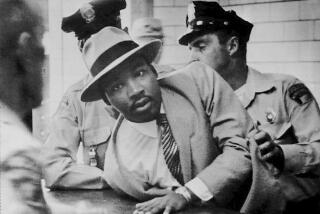Tavis Smiley talks of tough-love upbringing
PULL up a chair. Whet your appetite with a glass of ice-cold lemonade, and settle back as Tavis Smiley tells you about his growing-up years.
The popular TV and radio talk-show host and social activist has become a media personality, thanks to his many on-the-air interviews, including his recent exclusive talk with Venezuelan president Hugo Chavez. He’s also the author of several books, including “Keeping the Faith: Stories of Love, Courage, Healing, and Hope From Black America.”
But the questioning, energetic persona of the airwaves yields to a quieter, more intimate tone as he unwinds his life’s story for co-author David Ritz in “What I Know for Sure,” a pulled-up-by-the bootstraps tale that flows as easy as molasses, lulling readers along.
Born in 1964 in Gulfport, Miss., Smiley describes his upbringing in a mostly white region of Indiana, living in a trailer amid a family of 13, including a grandmother and four orphaned cousins. Personal space was nonexistent, money was tight, daily church attendance was required, the trappings of the secular world were completely eschewed, and the children’s work in their father’s cleaning business was hard. But love was abundant, and the call to personal responsibility loud and clear.
Smiley’s story becomes transcendent when he discovers the words, cadences and ideas of the late Rev. Martin Luther King Jr. and is transformed by them. We see him as a teenager, squeezed into this trailer, headphones clamped to his ears, his family swirling around him, practicing the flow of King’s words, memorizing his expressions (“I have a dream”). That love for words, for crafting phrases, for oratory, ultimately becomes Smiley’s ticket into the larger world.
However, the tough love practiced by Smiley’s parents, both deeply religious Pentecostals, pokes vexingly in readers’ minds. Two examples stick out.
In middle school, Smiley was beaten by an older boy, Ralph. Because he didn’t fight back, the boy began to beat him daily. When Smiley’s mother learned of this, she had harsh words. “Every day that you let Ralph beat you ... you’re gonna get another beating from me.” Thus, two-for-one beatings became a daily occurrence until he’d had enough and fought back so fiercely he broke Ralph’s arm.
In another, Smiley describes how his father, convinced that the boy and his sister Phyllis had been disrespectful in Bible class, beat them with an extension cord, sending the children to the hospital and ultimately into foster care. Though Smiley eventually returned to the family (Phyllis never quite came around to that point), the emotional scars were not easily erased.
It’s interesting to note that Smiley never questions the contradictions between the violence he experienced at the hands of his devout Christian parents, and the nonviolence proffered by King, nor does he grapple with the theology or spiritual backing of either approach. He’s never lost his faith in God and he’s forgiven his parents, he tells us, and that seems to be the end of it.
We see Smiley’s gift for words pay off when he’s granted admission to the University of Indiana and shows up without ever having formally accepted his spot there. (His parents, wary of the secular world, refused to sign the form.) Without money for tuition, books, room and board, he chats his way into housing, a scholarship and a job.
The delightful, easygoing tone of the book, alas, gives way in the final chapters to the ambition that has marked Smiley’s rocketing career. We see him all but stalk then-L.A. Mayor Tom Bradley in search of an internship, battle with executives at BET (Black Entertainment Television) and skirmish with NPR (National Public Radio). Clearly, he’s learned the lesson about fighting back.
“What I Know for Sure” is engaging because the story is archetypal and compelling, even if most of the narrative remains at surface level. It’s a down-home tale of how one survives, learns and grows in a discordant world into something bigger and better.
*
Bernadette Murphy is co-author of “The Tao Gals’ Guide to Real Estate.”
More to Read
Sign up for our Book Club newsletter
Get the latest news, events and more from the Los Angeles Times Book Club, and help us get L.A. reading and talking.
You may occasionally receive promotional content from the Los Angeles Times.






